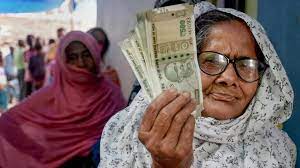Scheme 1.1- Pension (Old age)
What is old age pension?
The scheme "Indira Gandhi National Old Age Pension Scheme (IGNOAPS)" is one of the five sub-schemes of the National Social Assistance Programme (NSAP). Under IGNOAPS, citizens living Below Poverty Line and 60 years or above in age are eligible to apply. A monthly pension of Rs 600 - Rs 1000 depending upon the state share of the pension. The NSAP at present includes five sub-schemes as its components:
- Indira Gandhi National Old Age Pension Scheme (IGNOAPS)
- Indira Gandhi National Widow Pension Scheme (IGNWPS)
- Indira Gandhi National Disability Pension Scheme (IGNDPS)
What is the eligibility criteria for accessing benefits from the old age pension scheme?
- The applicant should be a citizen of India.
- The applicant should be living Below Poverty Line.
- The applicant should be at least 60 years of age.
Key aspects related to Old age pension
|
Benefits |
Amount (Rs.) |
Frequency |
Applies to |
Contribution by worker (Rs.) |
Time specified (days) |
Time taken (days) |
Fee specified (Rs.) |
Money spent (Rs.) |
Timeline for submission |
|
Old age pension |
A monthly pension of Rs 600 - Rs 1000 depending upon the state share of the pension |
Monthly |
Old age |
- |
What type of documents required for application?
- Duly filled and self-attested Application Form (proforma given the annexures of the scheme guidelines).
- Domicile Certificate
- Residential Proof (Voter card/ Electricity Bill/Aadhar Card)
- Age Proof (Birth Certificate issued by the School last attended or Municipal authority or SHO or through Medical Board)
- Aadhar Number
- Bank Passbook
- Ration Card
- Affidavit duly attested by Judicial Magistrate/Executive Magistrate that she/he is not in receipt of any pension/ financial assistance from any other source
What is the procedure to apply?
Why do domestic workers often fail to receive the pension?
Domestic workers frequently face challenges in obtaining pensions for several reasons:
On-gorund implementation issues:
- Stringent Approval Criteria: Inspectors may disapprove pension applications if they perceive the applicant's living conditions as relatively comfortable, such as having a well-built house or the presence of a television or children.
- Bribery Practices: Inspectors allegedly demand bribes, creating an additional barrier for domestic workers to access pension benefits.
- Cancellation of Cards: There are reported instances where BPL (Below Poverty Line) and OAPS (Old Age Pension Scheme) cards are canceled, particularly for individuals aged 80 and above, impacting their eligibility for pension benefits.
- Family Composition Criteria: Some pension schemes, such as the Old Age Pension Scheme, may have specific criteria related to family composition, including the presence of a son above 18 years of age. This condition can disqualify applicants.
Lack of supporting documents-
- Age Discrepancies and Illiteracy: Illiteracy among senior citizens often results in discrepancies in age, name, and address across various documents, potentially leading to the rejection of pension applications.
Policy design issues
- Non-Automatic Transition in Pension: In certain cases, the transition to an increased pension amount at a specific age may not be automatic, requiring additional steps for eligibility.
- Post-Covid Removals: Following the COVID-19 pandemic, there have been instances where the department removed individuals aged 80 and above from pension lists, assuming they had passed away due to COVID-19. This erroneous assumption further hinders eligible individuals from accessing pension benefits.
These multifaceted challenges, including restrictive approval criteria, bribery practices, family composition requirements, and bureaucratic errors, collectively contribute to the difficulties that domestic workers often encounter in securing pensions.


No Comments